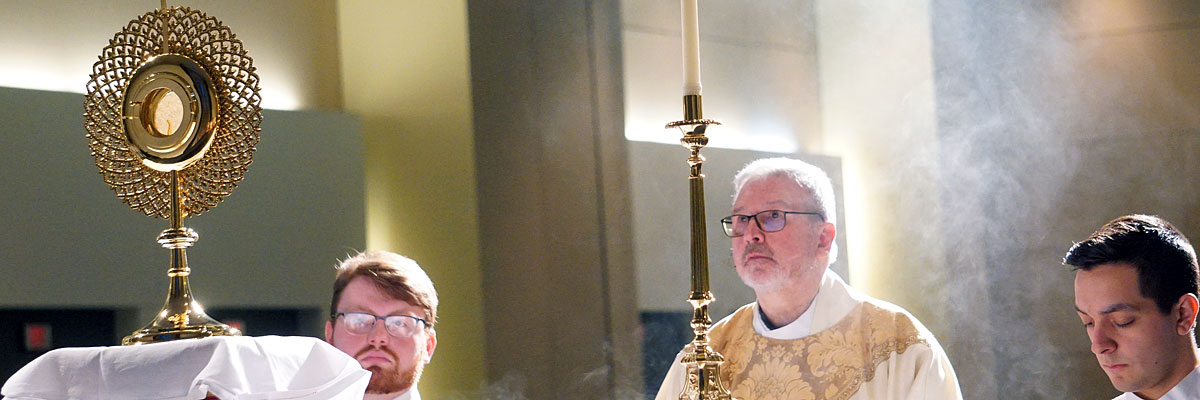Official Website of the
Catholic Diocese of Little Rock
Abraham, Sarah teach us to follow God
Published: June 18, 2011
This is the first column in a 13-part series
By Cackie Upchurch
Director of Little Rock Scripture Study
By most estimates, the Bible contains references of up to seven thousand people, several hundred of whom are mentioned by name. All have become part of our salvation story. When we take the time to revisit our ancestors in faith, we often come away with some new insight about the past as well as about ourselves.
 Stories abound that illustrate the common themes of human nature in every generation, themes revolving around hurt and forgiveness, accomplishment and defeat, greed and lust, as well as generosity and compassion. Those common human threads often open the door for us to step through, into an encounter with God who enters into the human situation, and in search of companions for our spiritual journey.
Stories abound that illustrate the common themes of human nature in every generation, themes revolving around hurt and forgiveness, accomplishment and defeat, greed and lust, as well as generosity and compassion. Those common human threads often open the door for us to step through, into an encounter with God who enters into the human situation, and in search of companions for our spiritual journey.
It is the theme of companionship and faithful witness that we explore in this series, a theme captured for us by the author of Hebrews. In what can best be understood as a sermon, he reviews the history of Israel to demonstrate God’s constancy and the fulfillment of faith-filled expectation in the person of Jesus, the great High Priest.
After reviewing the example of faith in the lives of Israel’s leaders, we read this encouragement: “Therefore, since we are surrounded by so great a cloud of witnesses, let us rid ourselves of every burden and sin that clings to us and persevere in running the race that lies before us while keeping our eyes fixed on Jesus, the leader and perfecter of faith” (Hebrews 12:1-2a).
And so we consider some of those people whose lives bear witness to God and to what it means to be a disciple. They do not lead perfect moral or spiritual lives, but are authentically human in their responses to God. The best starting place is to meet up with Abraham and Sarah, the patriarch and matriarch of our faith, whose story emerges toward the end of Genesis 11.
At heart, Abraham was a nomad, who traveled throughout the region of the Fertile Crescent during the course of his life. This is the area associated today with the Middle East and includes portions of modern day Iraq, Syria, Lebanon, Jordan, Palestine, Israel and bits of Turkey and Iran. The once fertile marsh lands between the Tigris and Euphrates Rivers has all but dried up over the centuries, but the faith of these two ancient people continues to produce fruit.
Abraham is remembered best perhaps for two things that show him to be faith-filled and obedient. First, he is known as a remarkably old man asked to trust in God’s promise and guidance. Along with his wife Sarah, he was called to leave the familiar for the unfamiliar, and to trust that their barrenness would be overturned and they would have descendents (Genesis 12:1-5; 15:2-6). Second, he is known as the patriarch who was willing to sacrifice his promised son, Isaac (Genesis 22:1-18).
Sarah, too, is probably best known for two things. First, she is willing to believe God’s promise of a child in her old age, but is too impatient to wait (Genesis 16:1-2; 18:1-15). Her actions nonetheless demonstrate creativity and determination. Second, although initially willing to settle for a surrogate child through her maid, Hagar, she later bears her own child, Isaac, and treats Hagar and the child Ishmael with bitter envy (Genesis 16:4-10; 21:9-21).
Perhaps not remembered as often is the fact that Abraham is twice reported to have passed off his wife, Sarah, as his sister (Gen 12:10-20; 20:1-18). She was given over to enemy rulers in order that things would go well for him traveling through their territory. By all counts, this cowardly act demonstrates that even this great father of faith can give in to self-interest.
However, this man also seems to have a keen awareness of God’s nature and human nature. When Sodom and Gomorrah are on the verge of well-deserved divine punishment for their sins (Genesis 18–19) Abraham pleads their case. Remembered by the prophets as immoral cities (Jeremiah 23:14), lacking in social justice (Isaiah 1:9-10), and with disregarded for the poor (Ezekiel 16:46-51), Abraham still dared approach God.
In a recent Wednesday audience, Pope Benedict XVI says that Abraham “knocked on the door of God’s heart” knowing he would find mercy for the innocent. Abraham and Sarah were simple human beings who responded to God, even if imperfectly at times. Whatever they each lacked was more than made up for in their courageous going forth “as the Lord directed” (Genesis 12:4).
Study Questions
- What role have other people of faith played in your own spiritual journey? Who has been helpful to you?
- When you consider the ancient world and the biblical characters who we learn about in Scripture, why do you suppose their stories still resonate with us when we live in a different time and place?
- What elements in the story of Abraham and Sarah are you most familiar with? How do these elements effect your impression of these two spiritual ancestors?
- Which events in the life of Abraham and Sarah resonate with your own experiences? What characteristics do they display that you would like to see increase in your life?
This article was originally published in Arkansas Catholic June 18, 2011. Copyright Diocese of Little Rock. All rights reserved. This article may be copied or redistributed with acknowledgement and permission of the publisher.









